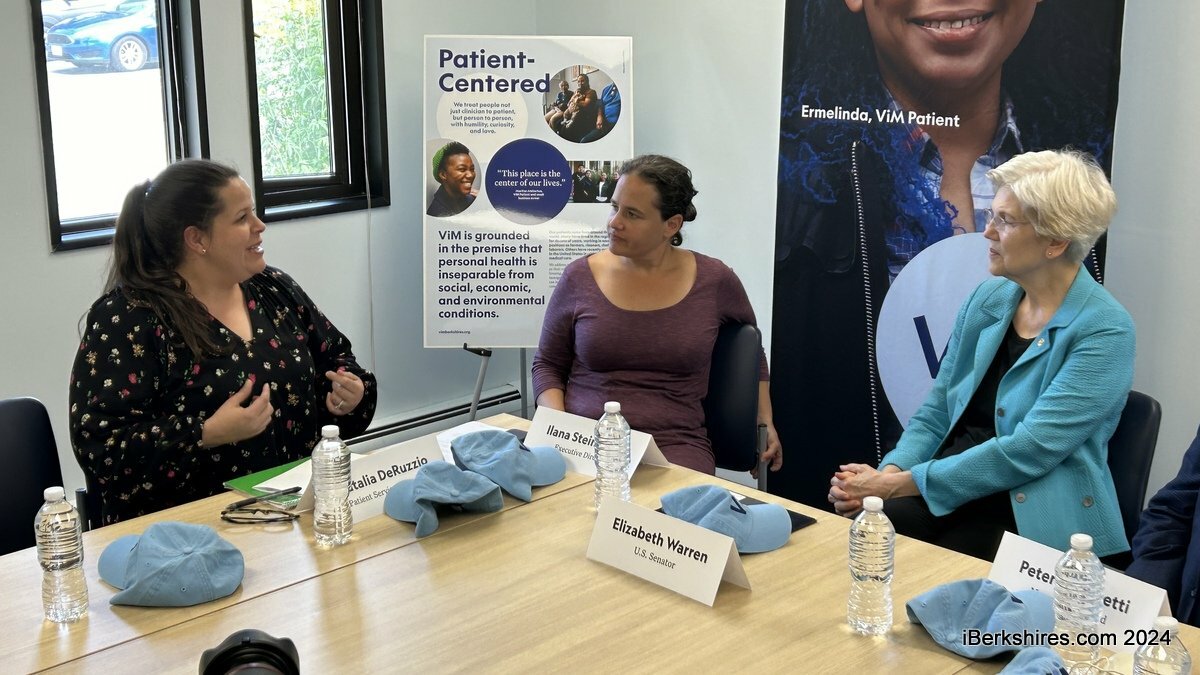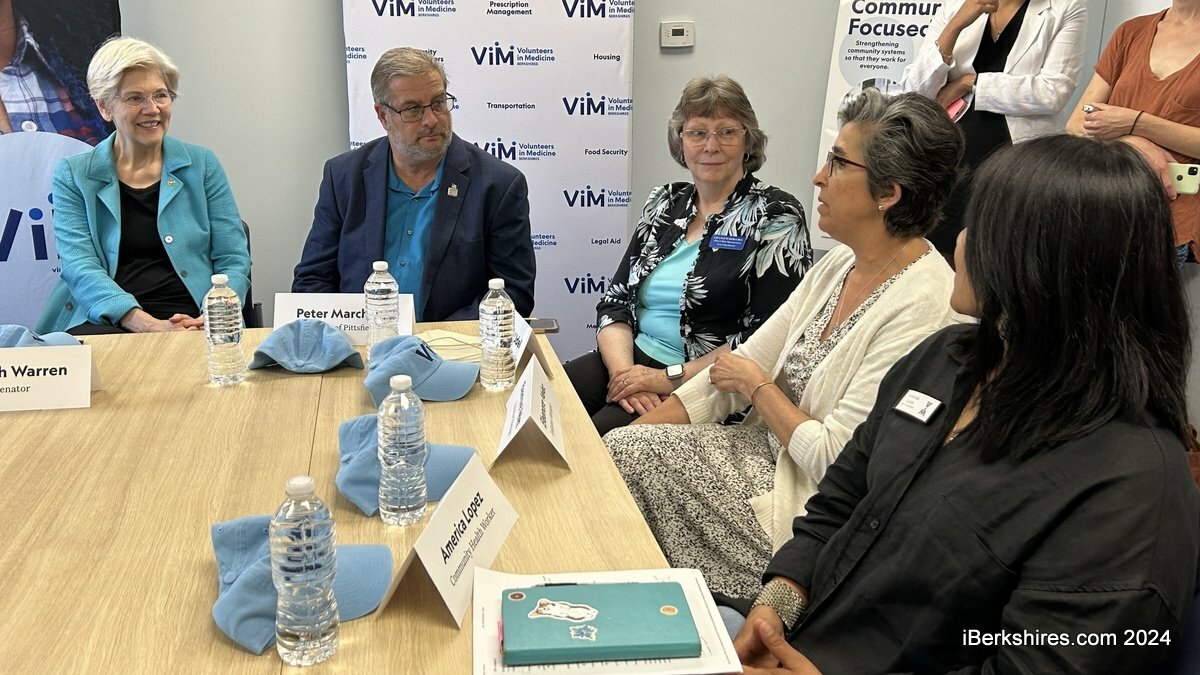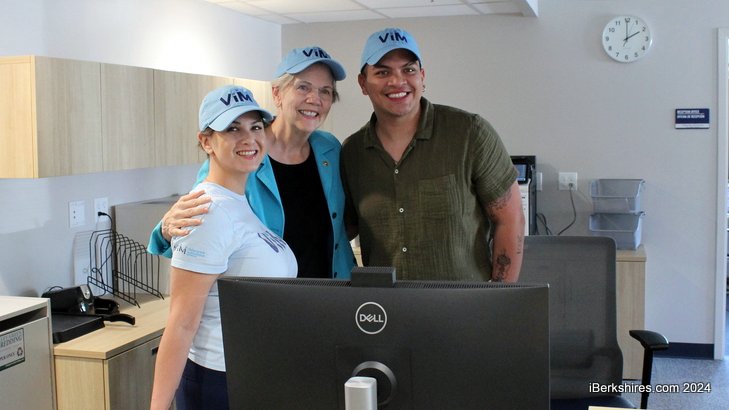

Senator Warren Hears Power of Health Care for Uninsured

PITTSFIELD, Mass. — The only population growing in the Berkshires are immigrants, said Ilana Steinhauer of Volunteers in Medicine, and the region needs to be a place where people want to come and can thrive.
"When we talk about health equity, when we talk about racial equity, when we talk about immigrants who are coming into the community or people who are living here, we all get to be in it," she said.
"We get to hear the stories and we get to reflect on what we are hearing and we get to respond and we don't have to stop. We can continue every week. The staff knows we don't stop."
U.S. Sen. Elizabeth Warren sat down in the nonprofit's newly renovated South Street office on Thursday, praising the health-care providers for their work. VIM provides access to health care for income-qualified, uninsured, and underinsured adults living in the region with primary care, dentistry, women's health, optometry, behavioral therapy, and more under one roof.
"I appreciate the work that you do, it is powerfully important both to the people who receive care but also to the community. I know that the mayor knows that to have a healthy, thriving community, everyone needs access to health care," Warren said.
"No community is better off if one part of the population is walled off from health care."
She said equitable access to health care also helps economically, as more people can work to support themselves, help their own families, and manage themselves and others.
"But that only happens if they're able to have adequate health care," she said. "It is not just accessible to the handful of people who can climb the mountain to get it but everyone who needs it, so I think of the work you're doing as very important to the people who receive it, but also very important to everyone who lives in Pittsfield and beyond."
The senator received a tour of VIM's second location, which opened earlier this year. The Great Barrington and Pittsfield offices are powered by around 170 clinical and nonclinical volunteers.
Steinhauer, the regional executive director, explained that money is the only limitation.
"We know how to run the model and we know how to take a dollar and the return on that dollar is much higher because we also know how to mobilize volunteers and we know how to cost contain because we understand the importance of what a navigator does in the health-care system, whether it is a community health navigator or medical navigator," she explained.
"And so those points in the health care system, the clinical time where a provider is seeing the patient, they are experts at that, they should be focused on that, they shouldn't have to think about everything around that visit because other people can be working around that patient to hold them at the center."
Even with all of the volunteers, staff still needs to be involved and this is where money is needed. Additionally, each patient costs about $2,000 per year.
"We don't work with insurance companies, we don't have a stream of any funding that comes," Steinhauer explained.
"We raise the funding every year which is a great thing and also something that's always evolving but the community supports an organization like this because they see that impact."
She said ensuring the security of smaller nonprofits in communities is important to continue the innovation that is needed for the future of the country. Larger institutions can slow change.
Warren said for-profit businesses have made it hard to change how health care is delivered.
"Businesses that have invaded our health-care system do not want to give up the huge amounts of money that they are making," she said, explaining that needs to be attacked head-on.
She is working at the federal and state levels to put more restrictions on private equity's ability to invade the health-care system.
"I think we need to have a conversation about why we permit for-profit outfits to come into health care and to take public dollars for providing health care," Warren said.
The health-care industry is also becoming more and more consolidated and vertically integrated, she added, and there needs to be more federal funding for health-care spaces such as VIM.
Warren also heard about the impact from the health-care center's staff.
Volunteer Manager Eleanore Velez explained that she is an immigrant and comes from a place where people could be lying outside of a clinic dying while waiting to be seen.
"I had a firsthand experience less than two years ago and so to be here and to know that the doctors who could be playing ball are here giving their free time to take care of a neighbor that they didn't know, that didn't play soccer with their kids, that is a human being that needs help, warms my heart in a way that is very unique," she said.
"This creates not only economic collectivity, well-being, it creates that kind of caring neighborhoods and kind of people we want to be. That we know we can be. This is the best of us."
Community health worker America Lopez said this work is more than giving people hope.
"It's actually like we're turning that hope into action," she said, paving the way for a better quality of life for themselves and their families.
One of the things that keeps Patient Services Manager Natalia DeRuzzio passionate and motivated is the fact that VIM has never been still.
"We always change, every year something different but it's always for good," she said. "We're always changing in a meaningful way and we're always welcoming not only the patients, this staff has also transformed and grown in that impactful way that really reflects the community we have."
During the COVID-19 pandemic, about $750,000 was passed through to patients who were not eligible for government benefits. Steinhauer said they did not close their doors and handled the uninsured Hispanic population — because they had been receiving care, not one went into the hospital .
This also highlighted the power behind allowing people to choose not going to work when they are sick because they had financial help for basic necessities.
"We need people to understand the power of community, what it means to come together, to volunteer, to care about each other and remember that we are humans," Steinhauer said.
"We are all humans who are parents or brothers or sisters or children, we are all it and we're forgetting how to listen actively and how to think and how to just be in a space together and this space creates that every single second."
Tags: health care, volunteers, Warren,















